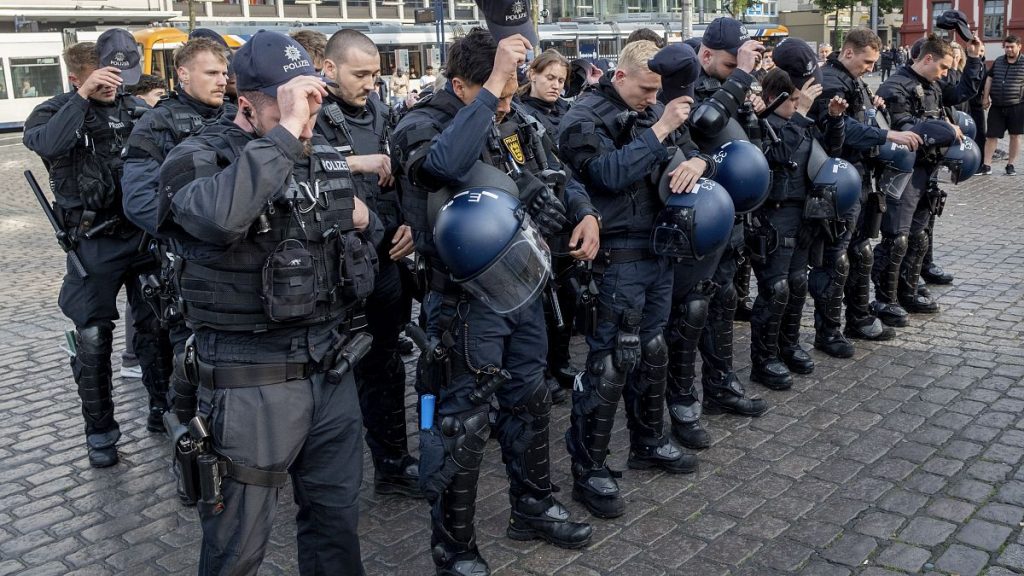The death of a police officer at the hands of an Afghanistan-born migrant in Germany has sparked political tensions in the country as far-right activists from the Alternative for Germany’s (AfD) youth movement took to the streets of Mannheim demanding stricter asylum and migration policies. The incident has occurred ahead of a crucial European election, further intensifying the political atmosphere in the country. AfD MP Nicole Höchst emphasized the need for those who do not appreciate Germany’s hospitality to leave, sparking controversy and criticism from left-wing supporters who accused the AfD of exploiting the incident for political gain. The rally organized by AfD was labeled as “extremist” by local authorities, leading to a clash between left-wing and right-wing activists later in the day which had to be broken up by the police.
Left-wing protesters held a vigil against hate and violence, denouncing the far-right narrative perpetuated by AfD in the wake of the tragic incident. Greens MP Gerhard Fontagnier criticized the far-right party for using the attack as a political weapon, calling it undemocratic and expressing concerns about the exploitation of the officer’s death for political gain. The clash of ideologies and political narratives led to tensions between the left-wing and right-wing activists, culminating in scuffles that police had to intervene to prevent further escalation. The differing perspectives on the incident and the response to it highlight the deep political divisions within German society.
The incident and the subsequent rallies and protests have underscored the ongoing debate and tensions surrounding asylum and migration policies in Germany. The AfD’s demands for stricter policies in response to the attack have been met with criticism from left-wing supporters who believe they are using the incident to further their own political agenda. The clash between the two sides highlights the deep-seated ideological differences and the polarized political landscape in Germany, especially in the lead-up to a crucial European election. The incident has reignited discussions about migration and asylum policies and the overall societal response to such tragic events.
The polarization and tension surrounding the incident and the ensuing protests and rallies speak to the broader issues facing Germany and other European countries in the current political climate. The rise of far-right movements and the increasing division between left-wing and right-wing ideologies have led to conflicts and clashes, as seen in the protests in Mannheim. The utilization of the tragic death of a police officer for political gain has sparked outrage and condemnation from those who believe it is inappropriate to exploit such events for political purposes. The incident has reignited debates about the role of political parties in shaping public discourse and the responsibility they have in addressing sensitive issues.
The involvement of young activists from the AfD’s youth movement in the protests and rallies following the officer’s death highlights the generational divide and the differing perspectives on immigration and asylum policies within German society. The clash between the AfD supporters and left-wing protesters reflects the broader ideological conflicts that are playing out in the country, as well as the challenges of finding common ground and fostering dialogue in a divided political landscape. The incident has drawn attention to the role of youth activism and political engagement in shaping the future of Germany and the broader European political landscape, highlighting the importance of engaging with these issues and working towards a more inclusive and united society.
Overall, the incident in Mannheim and the subsequent protests and rallies have brought to the forefront the deep-seated political tensions and divisions within German society, particularly surrounding issues of migration, asylum, and political ideology. The clash between left-wing and right-wing activists highlights the broader ideological conflicts and the challenges of finding common ground in a polarized political landscape. The exploitation of the officer’s death for political gain has sparked outrage and condemnation, raising questions about the role of political parties in shaping public discourse and the responsibility they have in addressing sensitive issues. Moving forward, it is essential for society to engage in dialogue and work towards bridging the divide to create a more inclusive and united future for Germany.


